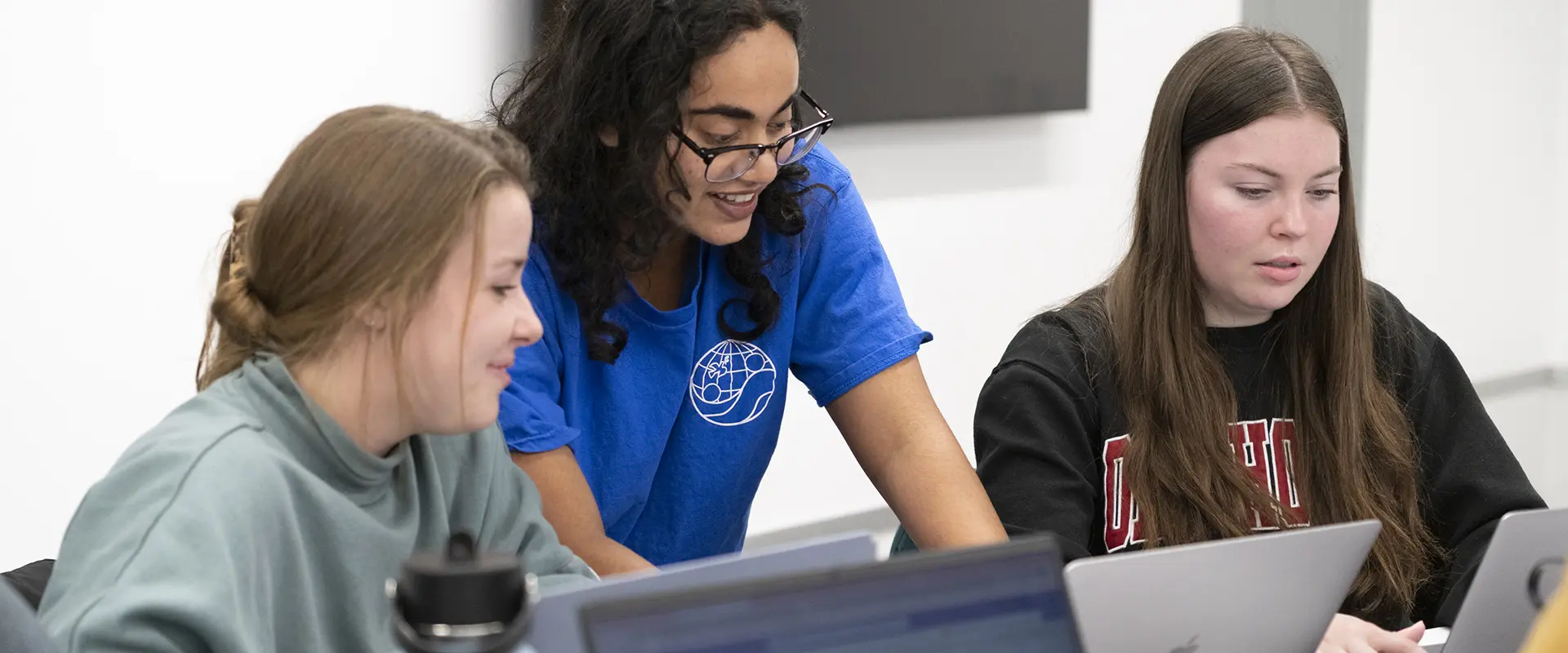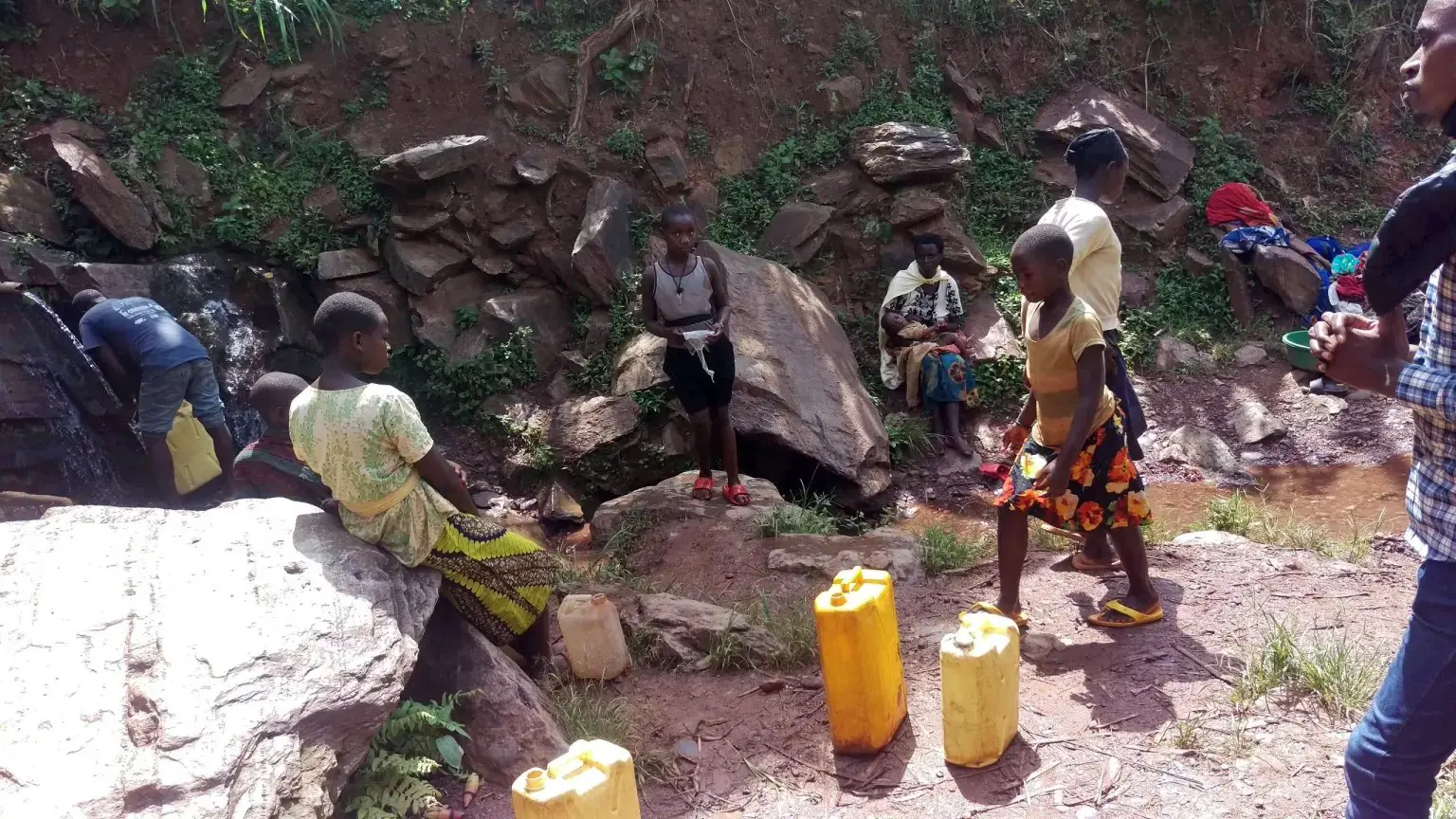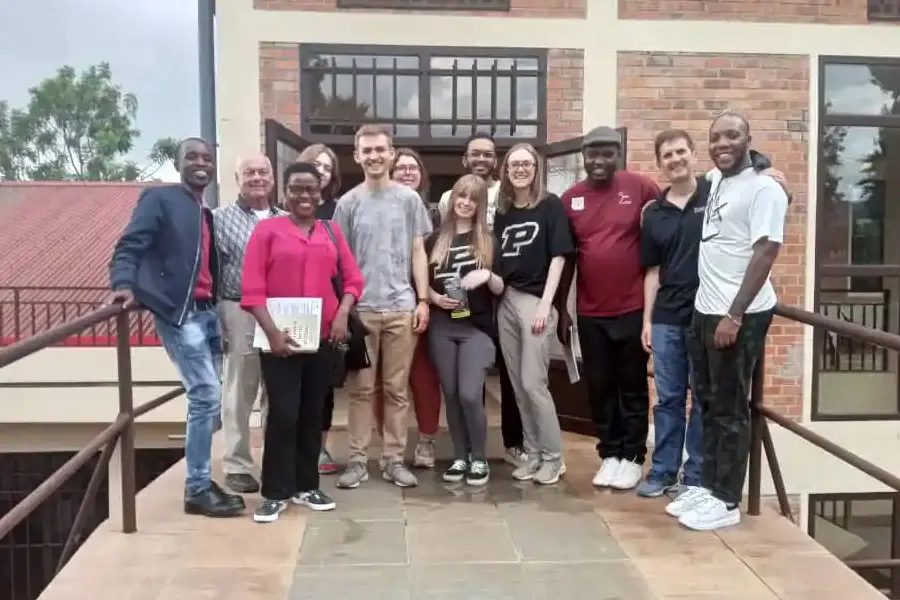
It’s a rare day when first-year students are asked to lead a team and raise more than $100,000, particularly for a project over 7,700 miles away, but that’s what distinguishes Integrated Business and Engineering (IBE) students, especially Marisa Weygandt and Claire Hawks. They’re up for the task.
They were up for the challenge when they chose to join the inaugural IBE class.
“I hoped to distinguish myself in business and with IBE, I thought having that engineering background would enhance my marketability.” — Marisa Weygandt, IBE '25
They showed up long before, back in high school.
“I did well in math and science and always rose to the top of leadership in clubs,” says Hawks. The IBE program attracted her to Purdue because it blended her strength areas. Weygandt also chose to major in IBE and signed up for the program's Engineering Projects in Community Service (EPICS) because she’d thrived in STEM classes and was a natural leader.
“I hoped to distinguish myself in business and with IBE, I thought having that engineering background would enhance my marketability,” says Weygandt.
Having them in class and seeing their abilities, Assistant Dean of Experiential Learning William Oakes sought Weygandt and Hawks out. He asked if they’d meet with the student-led Purdue Engineers Without Borders Team (EWB), one of 46 EPICS teams on which engineering and IBE students collaborate on multi-disciplinary projects. He hoped they’d click with the EWB team leaders and forge a powerhouse for a project that would make a huge quality of life impact for rural Rwandans.

“They had the kind of temperament for the task. Right away they had a great first impression and quickly developed a good relationship with the engineering students,” says Oakes. They could balance out the workload, meet the deadlines, and work well with the team.
EPICS, along with Vertically Integrated Projects (VIP), became integral learning opportunities to IBE when Daniels School and College of Engineering faculty came together to establish the new undergraduate program. The integration in classes and projects makes IBE “a destination program,” notes Dilip Chhajed, Associate Director of Master’s and Online Programs and Executive Director of IBE.
Working in teams on these physical projects helps IBE students “understand how engineering works, not just how to do math and engineering stuff, but how engineers think,” says Chhajed. “You don’t have an appreciation of how other people are unless you communicate, interact, have a disagreement with and try to persuade them, or they try to persuade you and you try to find a middle ground.”
“I have to say as a faculty member, truly sharing leadership with students in our EWB section of EPICS is a different experience. We’ve gone through some trials and iterations,” says Oakes. As director of EPICS, Oakes has come to appreciate student leadership. Initially, EWB was a club on campus, and he brought it into EPICS as a class, a win-win for students who now earn credit for bringing a project from adoption through iteration to realization.
“You don’t have an appreciation of how other people are unless you communicate, interact, have a disagreement with and try to persuade them, or they try to persuade you and you try to find a middle ground.” — Dilip Chhajed
Students apply to join EWB as a club for the first semester. If they make it, they can take the EPICS course and earn credit for being part of the core design team. Before IBE, the Engineers without Borders team had trouble filling the business development roles. Members who were engineering students were to rank the four specialized teams they could join. Engineering students tended not to select the business development team. Those who ended up on it struggled to find the skills and motivation to make the financial aspects of the project flourish.
Before IBE’s Hawks and Weygandt joined the team, EWB leaders chose a heftier than usual project: providing clean water solutions for a partner on the continent of Africa. IDA-Rwanda (Integrated Development Action Rwanda), a rural-focused nonprofit run by Isaac Mugabe Hatangimana, had written a proposal for a $100,000 project, far larger in scope and cost than Purdue EWB’s previous projects.
Hatangimana’s commitment began with helping rural villages like his childhood home. While working on a project nearby, a man from Rubona buttonholed Hatangimana and insisted on making his case. The people of Rubona were getting sick from using the dirty river flowing close to the village, because it took so much more time and effort to hike up the steep hill with jerry cans to retrieve clean water from a spring there. Hatangimana returned to his office to puzzle through his options. Engineers Without Borders came to mind, so he wrote up the proposal that won over Purdue engineering students.

Population
13,400,541 (2023 Est.)
Area
Land: 24,668 Sq Km
Water: 1,670 Sq Km
Clean Water Access
(Unimproved Water Access for the Population)
Urban: 7.7% / Rural: 19.3%
Water-Borne Illness Risk
Bacterial diarrhea, Hepatitis A, and Typhoid fever
The first phase was fundraising for designing and installing a 10-liter tank at the spring. The second phase was creating pipes to bring water down to the village of about 3,000 people and installing multiple taps. The final phase was to construct an 80,000-liter tank within village limits that will serve nearly 12,500 people in the next 10 years. What started as a $100,000 project grew to $120,000 and added the third phase, feasible because of the IBE student initiative.
IBE’s Weygandt and Hawks surged the fundraising efforts. They learned to write grants and pitch crowdfunding to the team’s friends and family networks. They tested “donut dash” stalls outside of athletic events to allow Purdue fans to pick up a snack on their way in or out. They proposed a 5K, though Hawks notes that building effective fundraising events means building a culture of anticipation, and that often takes multiple years of promotion before such activities raise notable amounts of money.
Hawks and Weygandt value their commitment to the Rwandan water project. Most IBE students take EPICS (or VIP) for credit in their first and third years in the program. Some split their experiential learning between EPICS and VIP. Few take the course three years running as Hawks and Weygandt did.
Along with the rest of their team, they met the initial proposal’s phase one and phase two completion, so they and IDA-Rwanda agreed to the third phase, the huge tank that will store water for the growing population in the Rubona village area. With more than 17% of Rwanda, mostly in rural areas, still in need of clean water, this project will reduce the risk of water-borne illness in the nation.

The EWB project allows for team members to apply to travel to Rubona, giving them a chance to see what life is like for young people in Rwanda.
“It humanizes the work, seeing the young children at risk who approach and want to hold hands with students,” says Oakes. Since not all students can travel there — Weygandt and Hawks couldn’t make it work with their multiple internships — Purdue set aside funds to bring IDA-Rwandan partners, including Hatangimana, to the U.S. twice, and provided funds so they could meet both Purdue students as well as other partners.
Hawks and Weygandt experience an “a-ha moment” during the visit when team members wrapped up a work session with their overseas partners.
“Let’s get ice cream at Silver Dipper,” proposed one Purdue student. Hawks remembers how their Rwandan partners marveled at the easy access to ice cream. She’d grown up stopping at the Silver Dipper weekly and realized what she took for granted might be a treat for rural Rwandans.
As they wind up their time with EPICS, Hawks and Weygandt are learning another valuable business skill, how to hand off leadership to the next generation so that the organization thrives without them. They’ll take their talent and work ethic with them, but they’re leaving behind documentation for what has worked. They are training new IBE students to reproduce their successes while also making their own signature mark on Purdue’s EWB team and working on a second project to design a Hurricane Resistant Community Center for the Grand Caillou/Dulac Band of Biloxi-Chitimacha-Choctaw along the Gulf of Louisiana.
“These IBE students are our pioneers and heroes. They took a risk to come to a new program. It was difficult to carve the path, but they did it,” notes Chhajed.